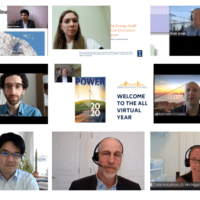2020 POWER Conference on Energy Research and Policy: Recap
 June 4, 2020
June 4, 2020
This year we presented the POWER Conference as a series of four virtual sessions. If you were not there, here are some highlights of what you missed:
Session 1: Wholesale Power Markets
Amol Phadke (Lawrence Berkeley National Lab) presented analysis on how the rapid drop in wind, solar and battery prices could enable cost-effective deep decarbonization by 2030. Frank Wolak (Stanford) followed with research on how the growth in wind and solar energy in Europe could be challenging for European market designs. James Bushnell (Energy Institute Faculty Affiliate, UC Davis) and Delphine Hou (California Independent System Operator) helped put the research into context.
Session 2: Energy Efficiency
Erica Myers (University of Illinois) presented research on how an energy efficiency audit and disclosure program in Austin, Texas has helped buyers and sellers. Sam Stolper (University of Michigan) showed how machine learning can find which consumers respond most and least to an energy efficiency program. Meredith Fowlie (Energy Institute Faculty Affiliate, UC Berkeley) and Liane Randolph (California Public Utilities Commission) discussed the implications of the research on current energy efficiency challenges.
Session 3: Retail Rate Design
Many consumers still do not have to pay for the energy they use. New research by Koichiro Ito (University of Chicago) showed how introducing individually-metered heating led to big welfare gains in China. Complex electricity rates can cause consumer confusion and lead to unexpected responses. Research by Blake Shaffer (University of Calgary) illustrated an example in British Columbia. Severin Borenstein (Faculty Director at the Energy Institute) and Cyndee Fang (San Diego Gas & Electric) explored the research further.
Session 4: Environmental Justice
“Hidden pollution” harms low income communities more than others. Research presented by Catherine Hausman (University of Michigan) discussed why. At the same time, environmental justice community groups and citizens are playing a growing role in highlighting the harms of pollution. Christopher Timmins (Duke) and Arsenio Mataka (California Attorney General’s Office) emphasized the importance of this trend.
Go to the conference webpage for more details about the papers including titles, coauthors and abstracts.
See you next year!
